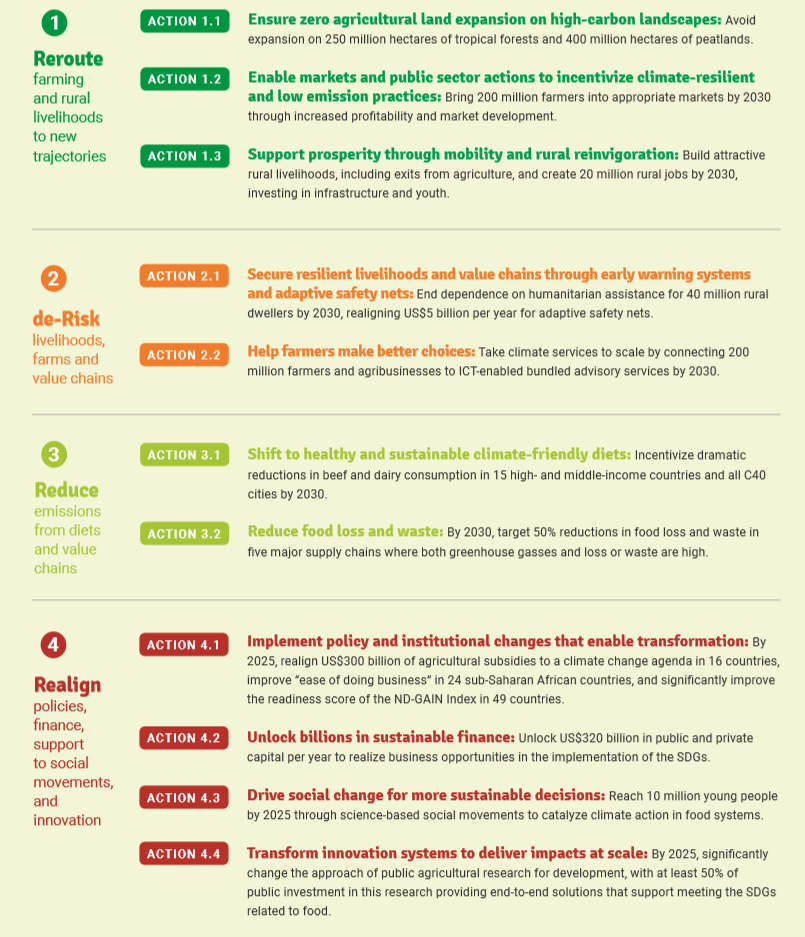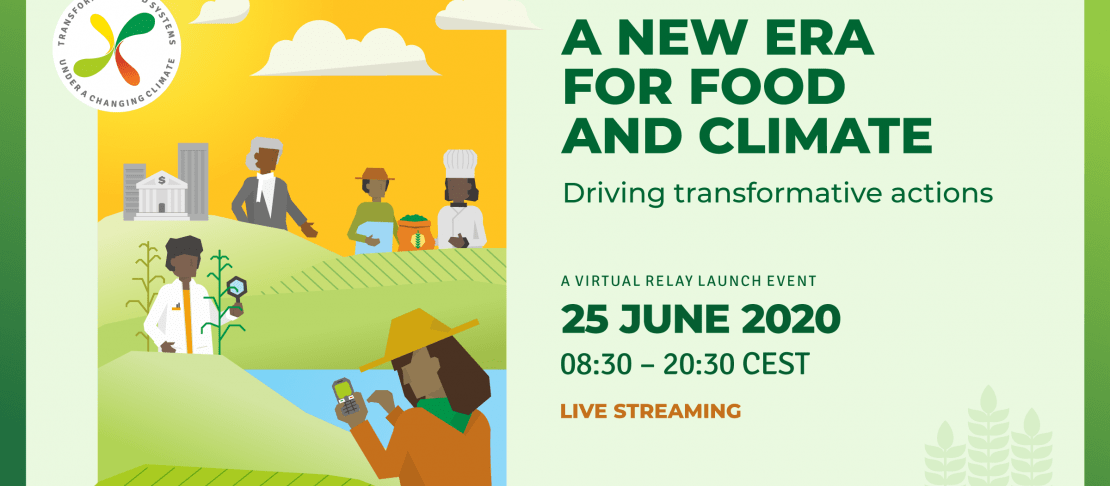
Influential voices from six continents present path to climate-smart, food-secure future in wake of new UN report warning climate stress contributing to COVID “food emergency”
WAGENINGEN, THE NETHERLANDS – Influential voices from six continents present path to climate-smart, food-secure future in wake of new UN report warning climate stress contributing to COVID “food emergency”.
With COVID-19 intensifying hunger even in wealthy countries, influential food, agriculture and environment experts from six continents today responded to this bracing wake-up call with an ambitious roadmap for resetting food systems that were already being hit hard by climate change. It offers the most comprehensive global plan to date to rebuild all types of food production around the world—from smallholder farming to large-scale production—that have been rocked by the pandemic but will face even greater challenges from climate change.
The report, “Actions to Transform Food Systems Under Climate Change,” was developed under the guidance of the CGIAR Research Program on Climate Change, Agriculture and Food Security (CCAFS). It comes close on the heels of a new assessment from the United Nations warning the pandemic could precipitate a “global food emergency.” The UN is especially concerned about food systems in places like sub-Saharan Africa that prior to the pandemic were reeling from a surge in droughts and floods—and where global heating is likely involved in East Africa’s ongoing battle against locust swarms.
“It’s time for all of us to get talking about food and most importantly about food systems,” said David Nabarro, a World Health Organization Special Envoy for COVID-19 and Curator of the Food Systems Dialogue who is kicking off a round-the-world “relay” briefing on the action plan. “That’s all the different elements—from food production to processing to marketing and consumption, and all the steps along the way.”
The report lays out a clear, 11-part plan—and points to a wide number of readily available innovations—that can make food systems far more resilient to both climate and non-climate shocks.
The 11 actions (listed in detail at the bottom of this page) include efforts to sustainably increase food production in developing countries in ways that increase incomes and food security in poor, agriculture-dependent rural communities. Doing so, the report states, could dramatically reduce the need for humanitarian assistance in the coming years, freeing up billions of dollars for investing in social safety nets. The report also offers strategies to avoid expanding food production into carbon-rich tropical forests and explores options that can support healthy, climate-friendly diets.
In addition, the report lays out a policy framework for directing US$320 billion in public and private finance to food systems transformation. And it seeks more support for “youth-centered social movements” committed to building sustainable food systems, noting they can be especially effective agents of change.
“Our work over the last 10 years to address the impacts of climate change on food production, and vice versa, has produced a series of transformative interventions that can energize efforts to ‘build back better’ in the aftermath of COVID-19,” said CCAFS Director Bruce Campbell. “This endeavor is especially important for several hundred million smallholder farmers in the developing world. They were already struggling against climate change before this pandemic hit and will face even greater climate threats long after it has ended.”
Climate change: The slow-moving counterpart to COVID-19
While there are concerns the pandemic could significantly increase hunger and malnutrition in the short-term, the report points to even greater dangers looming in the coming decade as temperatures rise, weather extremes become more common and rainfall less predictable. It cites recent research findings noting that:
- By 2050, climate change could displace 200 million people, the equivalent of roughly two-thirds of the population of the United States.
- Rain-fed crop production that currently sustains Southern Africa may not be possible in most of the region.
- Fish catches will decline by up to 10% in tropical regions.
- Droughts, floods and heat waves will become more frequent and intense. Just a small increase in drought severity alone could raise the risk of violent conflict in places like Somalia.
- By 2050, the impact of elevated carbon dioxide emissions on crop nutrients could cause an additional 175 million people to suffer zinc deficiency and 133 million to become protein deficient.
Food solutions from around the world present opportunities in time of crisis
At the same time, the report offers an abundance of evidence that farmers and food systems around the world are not destined for disaster—especially if the lessons from COVID-19 awaken action to confront climate impacts. The launch today features more than a dozen farmers and influential food and agriculture voices speaking live in a global “relay” from Ethiopia, Australia, Vietnam, India, Mali, Italy, the Netherlands, the United Kingdom, Colombia and the United States. They will present a wide array of solutions for creating a new era of climate-smart food production. For example:
- Imelda Bacudo, Advisor on Food Security and Climate Change for the ten-country Association of Southeast Asian Nations (ASEAN), will discuss the how the pact’s efforts to deal with the food challenges caused by the pandemic—including activating established emergency food reserve measures, specifically, rice interventions—is revealing the need for a more comprehensive plan for contending with other food system shocks.
“We felt the effects of this pandemic far earlier than many other regions and quickly moved to mobilize resources and policy changes,” Bacudo said. “It’s clear that dealing with the food impacts of these external shocks requires action far beyond the food and agriculture sector. And that kind of cross-sector collaboration remains a challenge, at the regional and national level.”
- Rikin Gandhi, CEO of Digital Green, will show how his groundbreaking company uses videos and digital content delivered via mobile phones to share content and train more than one million farmers in India and 500,000 farmers in Ethiopia every two weeks in practices like Zero-Budget Natural Farming or ZBNF. ZBNF combines the latest in agriculture science with traditional farming practices to help farmers use locally available inputs to sustainably increase crop productivity and adapt to changing growing conditions.
“In Ethiopia and India, with COVID-19 and a desert locust outbreak spreading just as the cropping season is getting underway, digital technologies are enabling extension agents and farmers to stay connected,” Gandhi said. “It means they can share data and insights from the field that can be critical to overcoming these twin challenges.”
- Ambassador Seyni Nafo from the Republic of Mali, a guiding force behind the African Adaptation Initiative (AAI) and former chair of the African Group of Negotiators on Climate Change, will discuss large-scale, integrated rural agricultural development programs that could have limited the food impacts of COVID-19—and will be critical for coping with climate change. He notes that work is underway in East Africa, facilitated by AAI & Global Commission on Adaptation (GCA), to mobilize at least US$300 million in public and private sector financing to improve access to affordable credit, digital farmer services and sustainable farming technologies like drip irrigation—with all made available to local communities via a single initiative.
“There are many proven approaches to making our food systems far more resilient to external shocks,” Ambassador Nafo said. “But they have not been implemented at an adequate scale to provide rural communities with the support they need.”
- Dr. Lindiwe Majele Sibanda, Co-Chair of the Global Alliance for Climate-Smart Agriculture (GACSA) will discuss the potential of the newly formed African Continental Free Trade Area (AfCFTA) to increase regional trade in food commodities in ways that can fortify local food systems and encourage greater investments in smallholder farmers. She notes that border shutdowns prompted by COVID-19 have highlighted the important role of imports and exports to maintaining adequate supplies of affordable, nutritious food. She believes AfCFTA could play a crucial role in building resilience to climate change by, among other things, stimulating investments in production and marketing infrastructure that enable local farmers and food companies to supply consumers across the continent.
“Promoting intra-regional trade in agriculture commodities and food products is crucial for Africa’s food security, both in the short and long-term,” Dr. Sibanda said.
- Ruben Echeverria, Emeritus Director General of the International Center for Tropical Agriculture (known by its Spanish language acronym CIAT), noted the growing practice in the tropics of Latin America—with great chance of spreading to other parts of the global south—of combining crop-livestock-forage systems with trees. These so-called “silvopastoral” systems increase cattle productivity and improve animal welfare—for beef and dairy. They are very different from the industrial “feedlots” and from the extensive low-productivity more traditional livestock production systems and add trees to the landscape, instead of cutting forests for grazing land, all coming together to dramatically reduce emissions.
“If you take into account that two-thirds of the agricultural land on the planet is grazing land, these are the types of systems that should be taken to scale for huge planetary impacts,” Echeverria said.
“The disruptions caused by this terrible pandemic have at least awakened the world to the fact that our food systems are far more vulnerable than many realized,” said Campbell. “Climate change is already compounding these problems, but the solutions we present—which seek bold transformations in everything from farming to trade, diets and government policies—offer an opportunity to pursue a much brighter future for people and our planet.”
###
Contact information:
Michelle Geis Wallace, Burness, at mgeis@burness.com | +1 703 371 7861
Saburi Chirimi at Burness, schirimi@burness.com | +254 721 569 369.
Transforming Food Systems Under a Changing Climate is an initiative that brings together leaders in science, business, farming, policy and grassroots organizations to identify pathways for transformation. The initiative is led by the CGIAR Research Program on Climate Change, Agriculture and Food Security (CCAFS) together with a wide range of partners that aims to realize a transformation in food systems by mobilizing knowledge and catalyzing action.
Four action areas and 11 actions for food systems transformation

